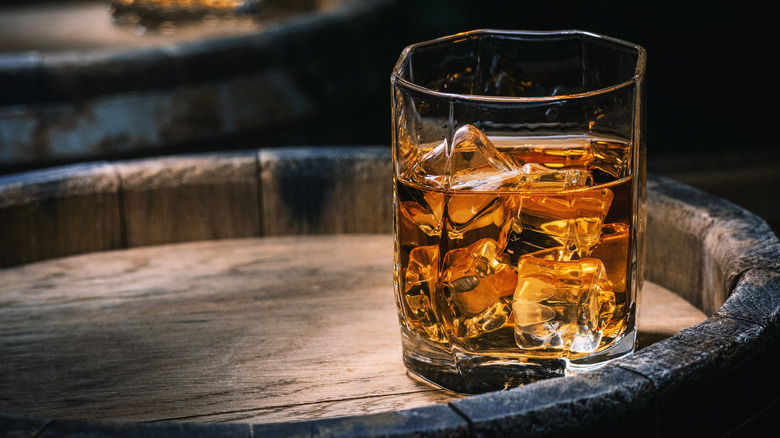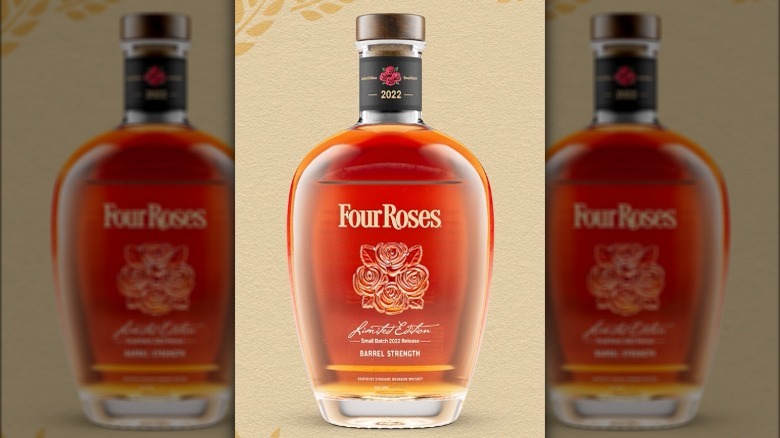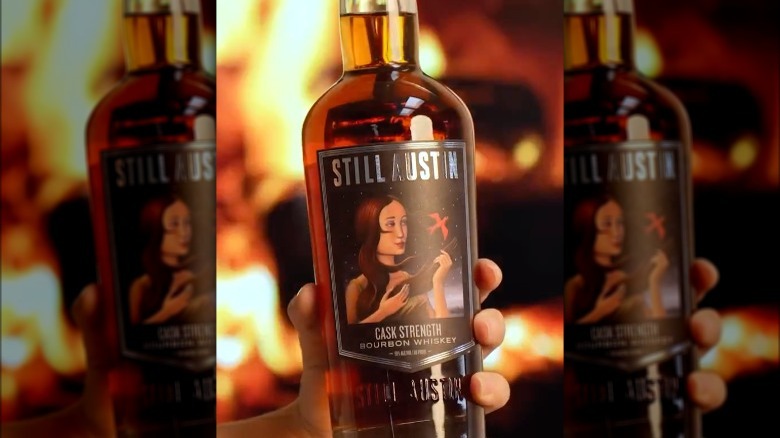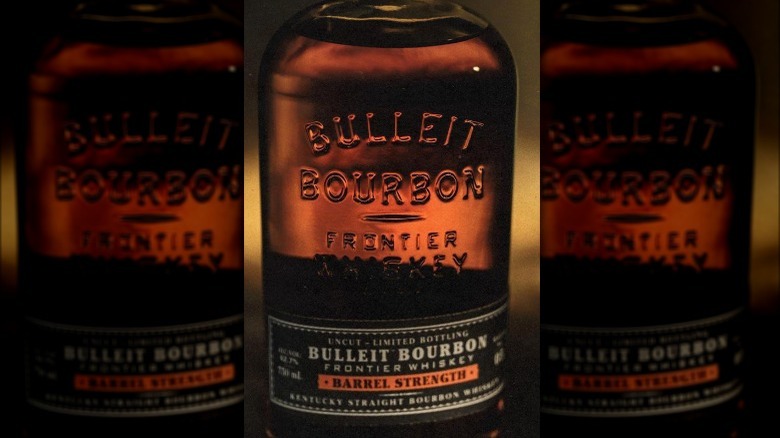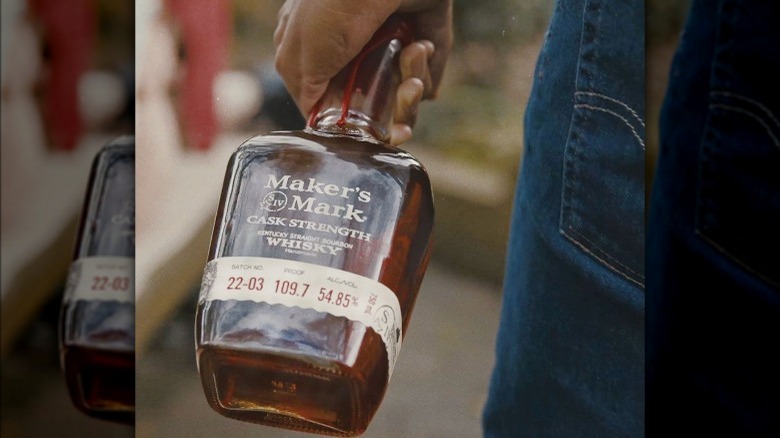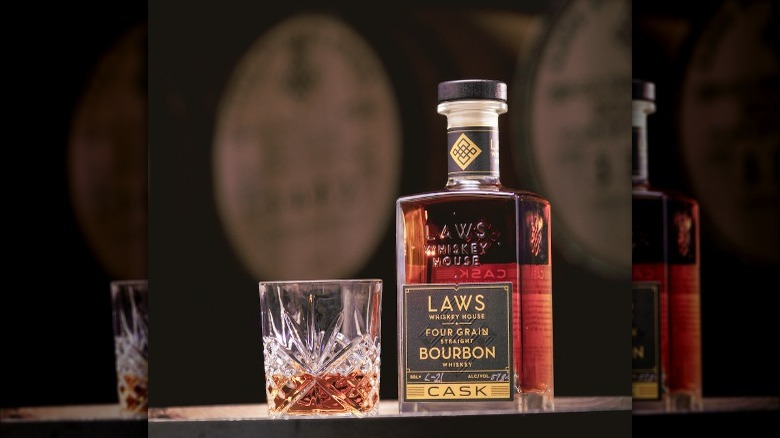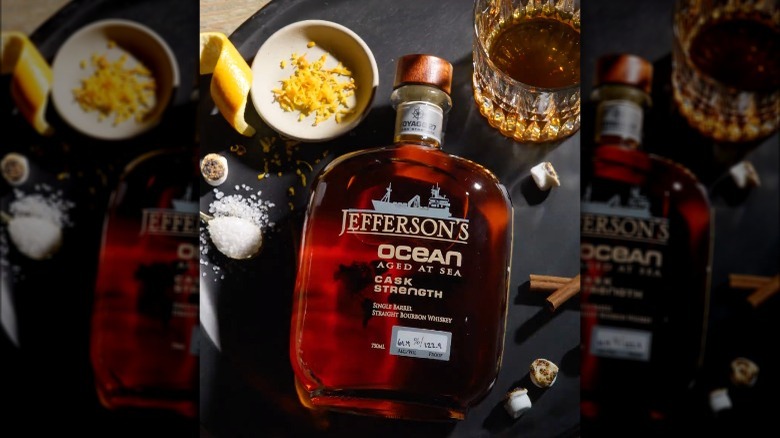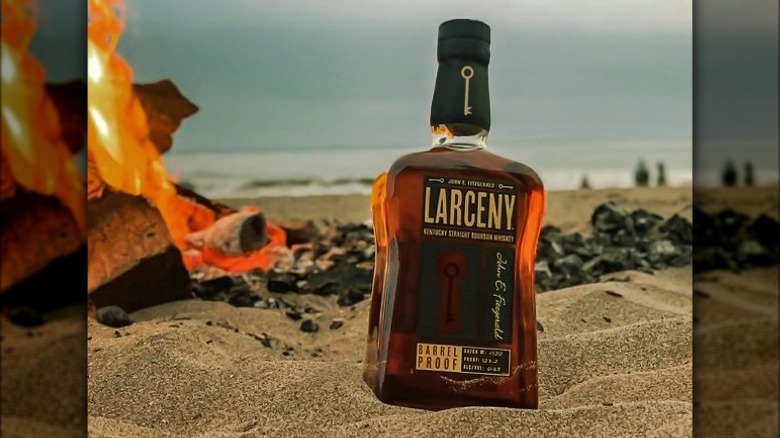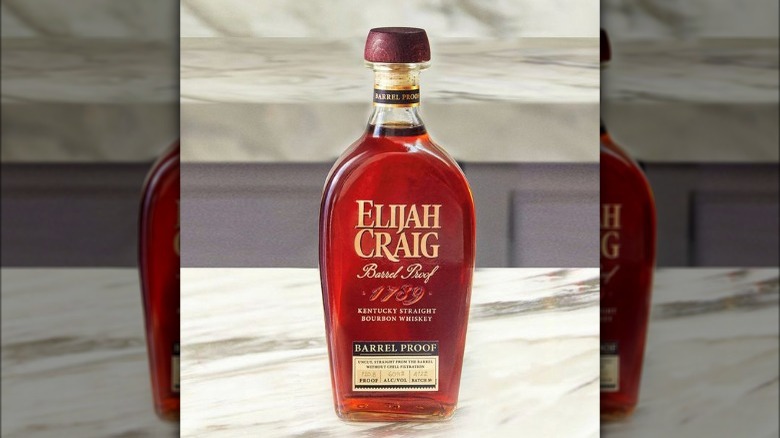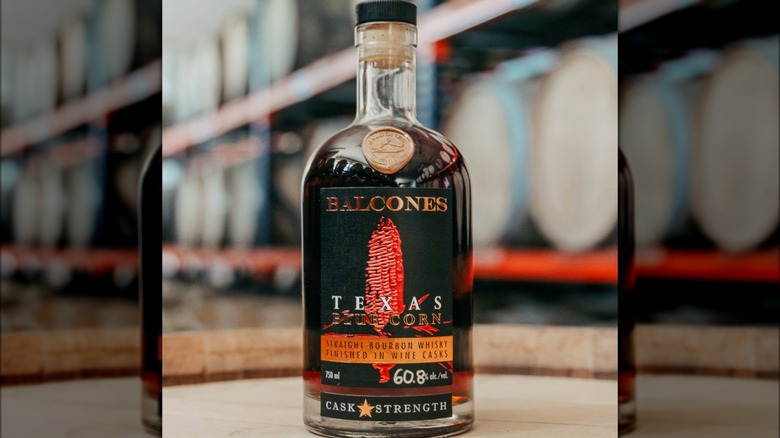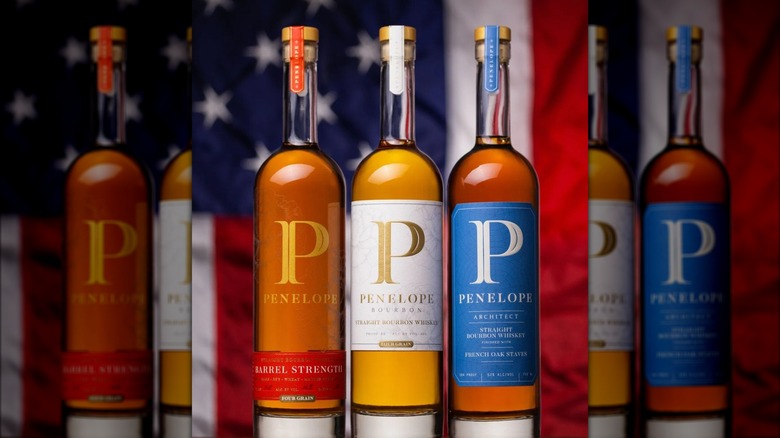Here's Why You Should Drink More Barrel-Strength Whiskey
When perusing the whiskey aisle of a liquor store, it's not uncommon for the average shopper to come across unknown terms like "barrel-strength" or "single barrel." Whiskey connoisseurs and distillers have a language all of their own, but it isn't hard for those with an appreciation for the spirit to learn. Cask or barrel-strength are terms that have had an increased presence in the whiskey sphere. The average person might only know that anything with the "barrel-strength" label will be boozier, but that's just the beginning of what makes it so special.
Barrel-strength whiskey is a category all of its worth exploring. It's not just higher in alcohol content, but it's also bursting with authentic flavor from the barrel. A glass of barrel-strength whiskey on its own can provide so much insight into a distiller's process, and give the drinker an entirely new appreciation for the dark spirit.
There is plenty to learn about barrel-strength whiskey that is best taught through tasting. To help convince you it's worth straying from your usual bar order, we've come up with several reasons why you should be drinking more barrel-strength whiskey. At the very least, you'll gain some solid knowledge about whiskey distilling if you don't end up with a new favorite spirit category altogether.
It's whiskey in pure form
You might be more convinced to try barrel-strength whiskey once you truly understand what it is — it's whiskey straight from the barrel it was aged in. Typically, whiskey is diluted after it comes out of the barrel to lower the ABV (alcohol by volume), usually resulting in it being bottled around 80 or 90 proof. Barrel-strength whiskey is usually 100 proof or higher, depending on the time spent in the barrel. It's whiskey in its pure form and more concentrated than the average spirit, which often results in more flavors.
In the U.S., whiskey can be no higher than 125 proof when it enters the barrel. However, the final proof depends on a lot of factors, from time to temperature. In hot environments, water evaporates faster than whiskey, so the proof can increase with time spent in the cask. It's also important to note that other types of whiskey, like Scotch or other varieties made in the U.K., follow different proofing regulations. These environments are also cooler, meaning that the whiskey can often evaporate quicker than the water, which has a distinct impact on the final result. For the sake of continuity, we're talking about American-made whiskey for this list.
The barrel flavor remains untouched
Another distinct aspect of barrel-strength whiskey is that it doesn't go through a chill filtration process. Most whiskey with an ABV of 46% or less will go through a process of cooling down and passing through a fine filter before it enters the bottle. The idea is to improve the visual appeal of the spirit so it doesn't have a cloudy or hazy appearance in the glass. However, some whiskey enthusiasts believe this process also strips some of the crucial flavor elements and chemical compounds from the whiskey, especially when it comes to mouthfeel.
Barrel-strength whiskey doesn't have that problem. Firstly, its high alcohol content tends to reduce that hazy quality. Secondly, some people believe it tastes more pure and naturally like the spirit. The full flavor of the barrel can be experienced in a whiskey that isn't chill-filtered — it's almost like you're skipping the bottle altogether and drinking it straight from the cask. It's safe to assume that any barrel-strength whiskey that is high in alcohol won't be missing any of those integral tasting notes.
It's more potent
Because barrel-strength whiskey isn't diluted before it's put into a bottle, you can also guarantee it's going to be more potent. The U.S. regulates that any bottle labeled "barrel proof" or "cask strength" can't be more than two degrees of proof lower than when it came out of the cask, so it's as close to sticking a straw in a barrel as it gets. It's a whiskey defined by its proof, which is evident with the heat from the alcohol in any average barrel-strength bottle of whiskey. For the average drinker, it means you'll undoubtedly feel more of a buzz after a sip of barrel-strength whiskey than your typical bar order.
When doing a taste comparison of regular whiskey vs. barrel-strength, the alcohol content will probably be the most noticeable difference. The ethanol content makes itself known on the nose and the palate. However, the potent flavor isn't just straight alcohol — it's a total balance of everything that happened during the aging process. There will probably be more distinguishable flavors and smells from a barrel-strength whiskey when compared to a regular-proof spirit, which usually makes it feel like a more complex sip.
No two expressions are the same
Another draw to drinking barrel-strength whiskey is the amount of versatility. No two barrel-strength bottles are exactly alike in flavor or alcohol content. Many factors impact the final liquid that comes out of the barrel and directly into the bottle — the environment it was kept in, the amount of time it spent aging, how much of the spirit evaporated, and more. It's like every time you pour a glass of barrel-strength whiskey, you're drinking a miniature science experiment.
When you're trying to figure out which barrel-strength whiskey bottle you want to buy at the grocery store, there are some factors to consider. The biggest is alcohol content — do you want a whiskey as high as 140 proof, or does a 110-proof spirit sound more of your speed? If you're planning on doing a little DIY dilution, the higher-proof spirit could be more fun to customize. It's also worth trying out your typical favorite whiskey brand's cask-strength expressions. You'll likely garner a whole new appreciation for your whiskey of choice when you experience what it tastes like straight from the barrel.
You will learn more about whiskey
Anyone who wants to up their knowledge about the world of whiskey should be drinking more barrel-strength whiskey. Many distillers believe that the best whiskey is drunk straight from the barrel, and barrel-strength bottles are the epitome of that notion without the need to make a trip to a distillery.
Truly, each glass of barrel-strength whiskey can be looked at as an opportunity to discover more. The liquid in every bottle is more highly concentrated than that of regular whiskey. The flavors from the wood sugars, tannins, and barrel extracts are primarily showcased in the barrel-strength bottles thanks to that big impact. And without the step of diluting with water to bring down the alcohol content, none of those flavors are dissipated or fall into the background. Your taste buds will notice the difference from your typical whiskey, and it will ultimately help you to comprehend the whiskey distilling process.
Barrel-strength is made for self-customization
It might be intimidating for some drinkers to start drinking barrel-strength whiskey because of the alcohol content. However, just because the distiller doesn't dilute the whiskey doesn't mean you can't. Another positive aspect of buying a bottle of barrel-strength whiskey is that you can customize how you drink it. You can try it straight before adding water to dilute it to see how it impacts the flavor. The best method for adding bottled water (tap water will affect the whiskey's taste) is with a water dropper.
You can also dilute your barrel-strength whiskey with one large ice cube that melts at a slow, but steady pace to see how the spirit opens up. Some people also like to get crafty with cask-strength cocktails. A typical Old Fashioned or Manhattan made with barrel-strength whiskey as opposed to a regular bottle will taste completely different, and usually in a good way.
The distiller's skills shine through more
Those whiskey drinkers who have a true appreciation for the craft can really experience it through barrel-strength whiskey. The small decisions made by a distiller can't be appreciated as much in a bottle that dilutes down all of that work. The makeup of the mash bill (the mix of grains used to make whiskey), the length of aging, and the type of barrel used all have an impact on the flavor that's best picked up through barrel-strength whiskey.
The unique way to appreciate the craft of distilling can especially be true if you get your hand on a limited release, which is like a distiller's pride and joy and probably won't taste like any spirit you've tried before. If you or someone you know is guilty of saying that most bourbon or American whiskey tastes the same, make them try two different barrel-strength bottles, and watch them instantly change their mind.
It can be a better value
We can already anticipate the comments in opposition to the idea that buying barrel-strength whiskey is often better for your wallet. The bottom line is that bottles in the category are generally more expensive than the average bottle of whiskey. Barrel-strength bottles can range from $60-$100 and higher, depending on the age and exclusivity of the release. The reasoning is that it's more expensive for the distillers to make — they're getting less whiskey in the same barrels as opposed to when they dilute the spirit before it's bottled. However, as with anything in life, there is a tradeoff.
The customer is ultimately getting more bang for their buck in a barrel-strength bottle because it's a more-condensed liquid with a higher alcohol content. Your money isn't going toward any of the water added by the distillers after the spirit came out of the barrel. In theory, you'd be able to drink it slower because it's boozier, and you can customize the dilution in your personal glass. You're also getting a higher quality product as reflected by the price tag. There are plenty of reasonably priced bottles of barrel-strength whiskey from brands like Wild Turkey, Knob Creek, Old Forester, and more that make it a little more reasonable to experiment with cask-strength cocktails at home.
Barrel-strength bottles are often more exclusive
As previously mentioned, a lot of barrel-strength whiskey bottles are sold in more exclusive amounts than regular bottles. The high-proof expressions are expensive for distillers to make, so they often can only produce from a limited amount of barrels. The exclusivity means that once it's gone, sometimes you will never be able to try it again. It's also why there is such a huge boost in interest surrounding barrel-strength whiskey — people want to be able to say they've tried something that no one else can get their hands on.
It can become a fun pursuit for whiskey enthusiasts to hunt down those hard-to-find barrel-strength bottles of whiskey to add to their collection. It's not that every barrel-strength bottle is hard to buy — you're bound to find a couple of options at any decently-stocked liquor store. However, it can become more of a hobby to find exclusive bottles, and check them off your list.
It usually tastes better
Taste is definitely subjective, but many whiskey enthusiasts tend to agree that barrel-strength whiskey usually tastes better than its diluted counterparts. It's like a more emboldened and flavorful version than the original thanks to that concentration of flavor. The water used to dilute whiskey does nothing but mellow out the flavor and proof. In its pure form, barrel-strength whiskey is going to, by nature, have more of an impactful flavor because it's lacking that unnecessary water.
Some barrel-strength whiskey bottles can be a bit too strong in alcohol to drink straight for some people. It's why we suggest diluting it yourself in your glass to adjust to your own taste rather than opting for the lower-proof version. Then, you get the best of both worlds with a full-bodied spirit that's mellowed out just to your liking rather than relying on the distiller to do the diluting for you.
